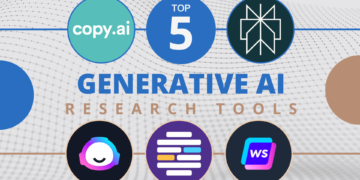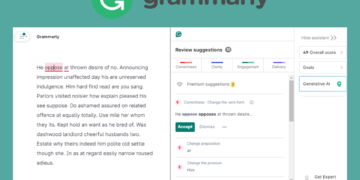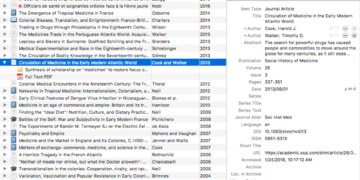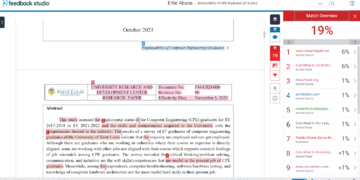Navigating the academic landscape demands precision, efficiency, and organization—qualities that can be hard to achieve amidst the sheer volume of research and writing tasks. Zotero, an open-source reference management tool, has emerged as a game-changer for scholars seeking to streamline their workflow. Here’s a comprehensive look at the top five reasons why Zotero is the ultimate tool for busy academics.
1. Effortless Reference Management
Managing references is a cornerstone of academic writing, but it can be a daunting task without the right tools. Zotero excels in this area by automating much of the process, saving scholars valuable time.
- Automatic Citation Capture: Zotero’s browser extension allows users to capture citation information directly from library catalogs, databases, and online sources with a single click. For instance, while browsing a journal article, Zotero can automatically extract details such as the title, authors, and publication date.
- Citation Styles Galore: Zotero supports thousands of citation styles, including APA, MLA, Chicago, and many specialized formats. This versatility is useful for interdisciplinary research or adhering to specific journal requirements. Custom styles can also be created to meet unique citation needs.
- Smart Organization: Zotero lets you create collections and subcollections to categorize your research materials. For example, you might have separate collections for different aspects of your research, such as scientific studies, policy papers, and historical data.
2. Seamless Integration with Word Processors
Writing and formatting academic papers can be a time-consuming process, but Zotero’s integration with word processors makes it significantly easier.
- Effortless Citation Insertion: Zotero’s plugins for Microsoft Word, Google Docs, and LibreOffice enable you to insert citations directly from your Zotero library into your document. The Zotero toolbar allows for easy insertion and formatting of citations and bibliographies.
- Dynamic Bibliography Management: Zotero automatically updates your bibliography as you add or remove citations, ensuring that it remains accurate and correctly formatted. This eliminates the need for manual updates and reduces the risk of errors.
- Cross-Platform Flexibility: Zotero’s plugins work across various platforms and word processors, providing a consistent experience regardless of whether you use Windows, Mac, or Linux.
3. Organized Research Management
Keeping track of research materials and notes can be a challenge, especially with large projects. Zotero offers a range of features designed to help you stay organized.
- Hierarchical Collections: Create and manage collections of references based on your research needs. You can organize these collections into subcollections to keep track of different aspects of your project, such as literature reviews or data analysis.
- Tags and Notes: Add tags and notes to each reference to enhance organization. Tags can help categorize references by topics or methodologies, while notes allow you to record personal observations or summaries related to each source.
- Attachment Management: Store related files, such as PDFs and images, directly in Zotero. Attach these files to specific references or notes, centralizing all your research materials in one place.
4. Collaboration Made Easy
Collaborative research requires tools that facilitate teamwork and communication. Zotero’s collaboration features address these needs effectively.
- Shared Libraries: Zotero Groups enable you to share libraries with colleagues or research teams. This feature is ideal for joint projects, allowing all members to access, add, and organize references collaboratively.
- Group Permissions: Control access and permissions for shared libraries to ensure that only authorized members can view or edit certain content. This feature helps manage who can contribute to or review the shared research.
- Real-Time Syncing: Changes made by group members are synced in real-time, ensuring that everyone has access to the latest updates. This facilitates smooth collaboration and reduces the likelihood of duplicated efforts.
5. Cloud Syncing and Accessibility
In today’s mobile world, having access to your research from anywhere is a significant advantage. Zotero’s cloud syncing provides robust solutions for accessing and managing your research materials.
- Automatic Cloud Backup: Zotero automatically backs up your library to the cloud, protecting your data from loss due to hardware failure or theft. This ensures that your research is safe and recoverable.
- Multi-Device Access: Access your Zotero library from any device, including desktops, laptops, and mobile devices. This flexibility allows you to work on your research from different locations and devices.
- Offline Functionality: Work offline without losing access to your research materials. Zotero syncs changes when you’re back online, keeping your library updated across all devices.
The Review
Zotero
Zotero is more than just a reference management tool; it’s a comprehensive research assistant that enhances every stage of the academic writing process. From automating citation management to facilitating collaboration and ensuring data accessibility, Zotero provides a suite of features designed to support busy scholars in their quest for academic excellence. By leveraging Zotero’s powerful capabilities, you can focus more on conducting research and less on managing it, ultimately leading to more productive and successful scholarly endeavors.
PROS
- Efficient citation management
- Seamless integration with word processors
- Organized research storage
- Collaboration tools
- Cloud accessibility
CONS
- Learning curve
- Sync issues
- Limited features in free version
- Browser compatibility
- Storage limits
Review Breakdown
-
Ease of Use
-
Feature Set
-
Compatibility
-
Cloud Sync and Backup
-
Cost and Value





































